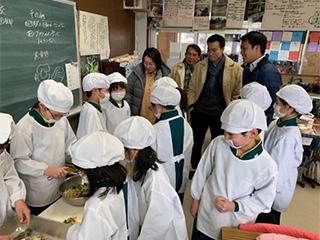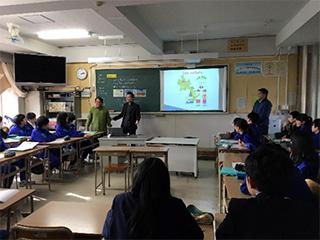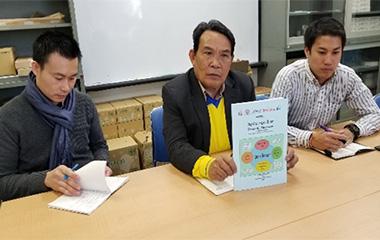The secretariat of EDU-Port Japan interviewed two professors of the National University of Laos (Dr. Ngouay Keosda and Mr. Vannasouk Bouasangthong) who visited Japan as a part of activities of 2018 EDU-Port certified project “Enriching practice and research on Ecohealth education through introduction of Japanese style teacher training and research system” (Representative institution: Shinshu University).
Q1:What was the most impressive thing during this visit ?
I was impressed by the fact that practical education is implemented at school in Japan. In particular, it was great that learning activities to enhance life skills such as serving school lunch and cleaning classrooms were actively done by children. In Laos, teacher-centered education has been implemented and learner-centered education has not progressed due to the lack of human resource development and teaching materials.
Q2:What do you think are the good characteristics of Japanese-style education ?

Observation of school lunch at Matsumoto Primary school Attached to the Faculty of Education of Shinshu University |
In Japan, the center of learning is the child, and children learn through their own practices and experiences. Teachers act as facilitators who support and lead children to learn by practice. It is done from early childhood education and I was surprised that young children can do many things by themselves at nursery school. In addition, it is wonderful that school has many environments and opportunities for children to learn through actual experiences, such as school grounds, laboratories, gardens, animal breeding grounds, musical instruments, and school lunch. I think that learner-centered education also appears in the structure of textbooks. Lao’s textbooks are teacher-centered structure which is confusing because it is full of unlearned letters, and teachers read them to children unilaterally. But Japanese textbooks are learner-friendly structure, so it is possible for children to do self-study. |
Q3:How would you like to utilize in Laos what you learned in this visit ?

Cultural Exchange class at Matsumoto Junior High School Attached to the Faculty of Education of Shinshu University |
It is difficult to compare the education of Laos with Japan’s in the same scale, or to adopt the learning in Japan as it is in Laos because the educational situation is completely different. First of all, I would like to start with what I can do in Laos. We need to change awareness and attitude of school principals and managerial staff in order to shift teacher-centered learning environment and culture to learner-centered one. We also would like to promote practical learning activities from early childhood. |
Q4:What kind of ecohealth education would you like to aim for in Laos in the future ?

Talking about the future ecohealth in Laos |
I would like to expand ecohealth education more in Laos. I would like to improve the quality of ecohealth education by revising the teacher’s guidebook so that teachers can teach ecohealth education by themselves. In addition, I would like to set time for reflection to clarify issues and achieve sustainable ecohealth education by continuous improvement. |
Statement from the secretariat of EDU-Port :
It was impressive that people seemed satisfied that they could visit schools in Japan for the first time and grasp a clear image of ecohealth education. The Japanese organizer reported that “After they visited Japan, both Japan and Laos sides could reach a common understanding on what could not be explained by words alone, such as atmosphere of the class, support of teachers to promote the learning of children, importance of the communication between teachers and children”, “I could share the prospects for the future with them during their stay.”
The visit was a meaningful opportunity for both Laos and Japan sides to deepen their understanding of each other. EDU-Port Japan will continue to support the activities and to develop the project in the future.







